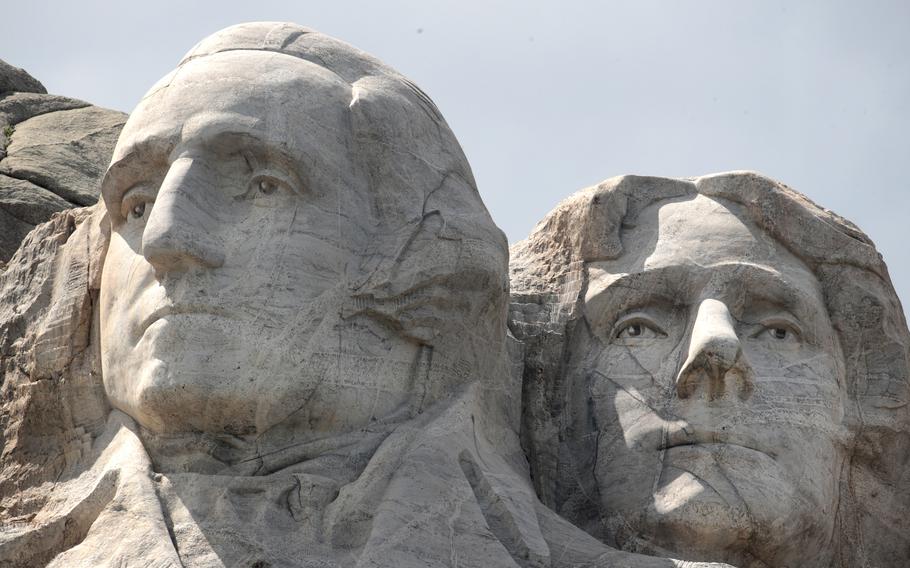
The busts of U.S. presidents George Washington, and Thomas Jefferson tower over the Black Hills at Mount Rushmore National Monument in South Dakota. One of the qualities Washington’s contemporaries most liked about him was that he was not eager for power. (Scott Olson, Getty Images/TNS)
From the beginning of the American experiment, one of its animating principles has been limited government overseen by citizen legislators.
Contrast that with the “big, beautiful” spending bill being steered through Congress by today’s career politicians, who euphemistically refer to themselves as “public servants.” America’s founders would be appalled.
One of the qualities George Washington’s contemporaries most liked about him was that he was not eager for power. This led to his June 14, 1775, appointment 250 years ago as commander in chief of the Continental Army.
He did have extensive combat experience, but it was years earlier and primarily in the style of backwoodsmen, not the fixed-line combat Revolutionary fighters would face against the British. Moreover, Washington was a slaveholder, problematic in a revolution dedicated to freedom.
So, others were considered for the commander in chief position, many of whom had more recent and relevant combat experience, such as Massachusetts militia commander Artemus Ward, who became Washington’s second-in-command; British-born Horatio Gates, then living in Virginia, who subsequently served as the Continental Army’s adjutant general; Philip Schuyler from New York; and former British officer Charles Lee.
Among the many possible choices considered by the Continental Congress, Washington stood out because he embodied the kind of leadership the colonists sought.
What were they looking for? For somebody totally unlike today’s so-called leaders.
As the late historian David McCullough recounts in his extraordinary book on Washington and America’s founding, “1776,” Washington was initially reluctant to accept the position of commander. He didn’t lobby for the position, and, when appointed, declared that “I feel great distress from a consciousness that my abilities and military experience may not be up to the extensive and important trust.”
Lest this be taken as false modesty, McCullough quotes from a letter Washington wrote to his wife, Martha: “Far from seeking this appointment, I have used every endeavor in my power to avoid it, not only from my unwillingness to part with you and the family, but from a consciousness of it being a trust too great for my capacity.”
Washington had the requisite charisma and leadership abilities, but he was also chosen because he didn’t crave the job. As the oft-quoted theologian and author James Freeman Clarke is credited with saying, “A politician thinks of the next election, a statesman of the next generation.”
In a world of hereditary monarchies, there was a very real possibility at the time of America’s founding that whoever gained power would refuse to hand it over when the time came. History is full of such examples. Washington posed little such risk.
As early as the 1760s, the American revolutionaries had been drawing parallels between their fight for freedom and the Roman Republic.
During times of war, the Romans would appoint a “dictator” to lead their armies. Dictators had broad powers, but only for a limited time. This allowed them to address the crisis at hand but return to a government of checks and balances once the crisis had passed.
The most famous of these dictators was Cincinnatus, a farmer who was called to defend the Roman Republic in 458 B.C. After being summoned from his fields, he won a speedy victory, resigned, and returned to his plow.
Americans began comparing Washington to Cincinnatus early in the Revolutionary War, and he did not disappoint. With the Treaty of Paris and the end of the war in 1783, Washington resigned and returned to his farm at Mount Vernon, Va.
He would be called back again in 1789 to lead the United States as its first president. After serving two terms, he retired again, establishing a precedent of two terms.
The following six two-term presidents adhered to that precedent until Franklin D. Roosevelt not only served a third term but also won a fourth before dying less than three months in. (The 22nd Amendment, passed by Congress in 1947 and ratified in 1951, now limits presidents to two terms.)
The greatest threat to limited government is leaders who covet power, gain it, and are reluctant to cede it.
Washington’s greatness came not only from his essential contributions in office but also from the statesmanship he showed when it was time to step aside.
Frederic J. Fransen is president of Ameritas College Huntington in West Virignia and CEO of Certell Inc. He wrote this for InsideSources.com.